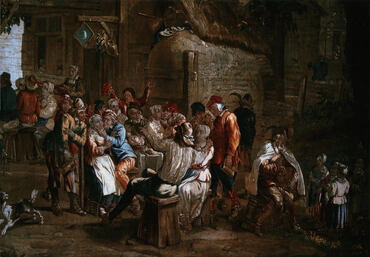There are two kinds of feasts mentioned in the Bible. Some were held to commemorate specific, one-time events, such as the feast Abraham held to celebrate the birth of Isaac. Others are commanded of the people of Israel as annual or repeated events. In general, the one-time feasts represent a conjunction of two spiritual states. We are, for instance, called on to bring our external lives -- what we do and think on a day-to-day basis -- into conjunction with the internal beliefs we hold in the Lord and his desires for good for us. At the times we succeed in doing that, we can experience a sense of joy and fullness that brings to mind a feast. The prescribed feasts represent the joy we can feel in worshiping the Lord -- both in ritual acts of worship and also the worship we offer when we live according to His commandments. These are fitting meanings, both because feasts are joyful and festive and also because of the spiritual meaning of food and drink. Food represents the desire for good, which ultimately comes to us from the Lord. Drink represents the true ideas that help us know what good is and how to act on it. Feasting involves acquiring large quantities of both, which is certainly a joyful thing.







